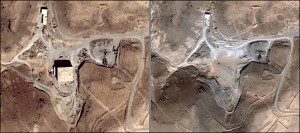Some might remember a certain incident a few years back. Very hush-hush. Israeli bombed something in Syria, only no one was sure what exactly was bombed or why. For some background reading try here, here, and here.

Al-Kibar; Before and After
The Israeli’s eventually said they had attacked a nuclear reactor of North Korean vintage. The Syrians have remained less specific. The issue has resurfaced of late in a series of revelations, accusations, and calls for mandatory inspections.
In May of this year the Syrian government admitted to having carried out nuclear experiments in the past that went previously unreported to the IAEA.
Well the issue has returned to the fore as the US envoy to the IAEA, Glyn Davies, called for further inspections of Syria Tuesday. The inspections would be aimed at clarifying the exact nature of the Al-Kibar site, as well as settle any ongoing questions regarding the nature of Syria’s weapons program. The current conventional wisdom is that Syria has not restarted it’s nuclear program in the aftermath of Israel’s military strike. I don’t need to remind you of how often conventional wisdom is proven wrong. According to reports, the IAEA would potentially use a tactic known as “special inspection” which would make any inspection requests legally binding. According to the Carnegie Endowment for Peace, the rule has been used only twice in the past.
While at first blush this development would seem to hurt Syria’s chances of being removed from the axis of evil JV squad, I believe this could be a step towards progress. I see the potential for Syria to use this issue to show itself as cooperating with the international community. If Syria were to open itself fully on this issue it could potentially reap the kind of rewards Gaddafi was able to receive when he lifted the veil on Libya’s weapons programs. Of course the opposite is also possible as it is perfectly conceivable that the Syrian government would choose to play the role of obstructionist, challenging an often weak IAEA inspection regime.
I’m curious to see what the official Damascus reaction to these statements will be, especially the public statements from President Assad. If the President chooses to downplay, or ignore, the issue than progress could be made. Even a standard denunciation of American/Israeli plots wouldn’t be awful. I would be worried by strong statements relating to Iran, pledges of support etc. We will see as this will most likely be an issue of some significance, that is if everyone doesn’t annihilate themselves in the next war.